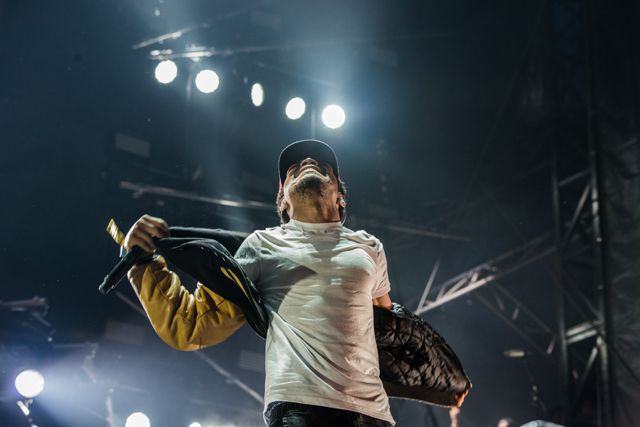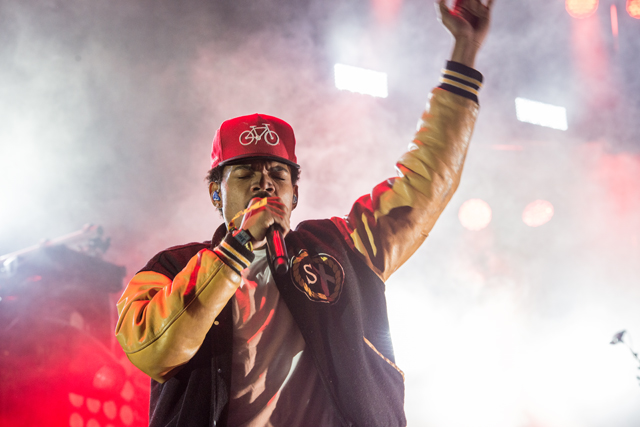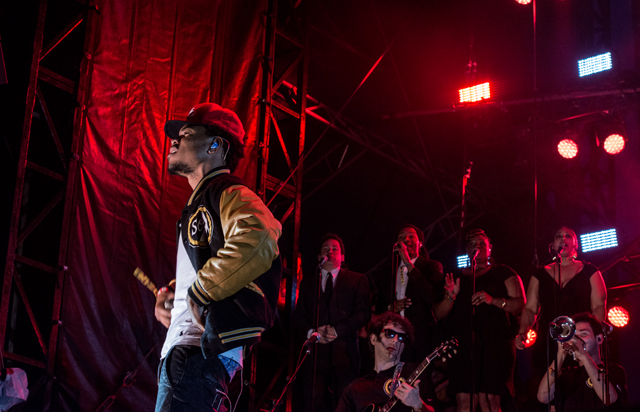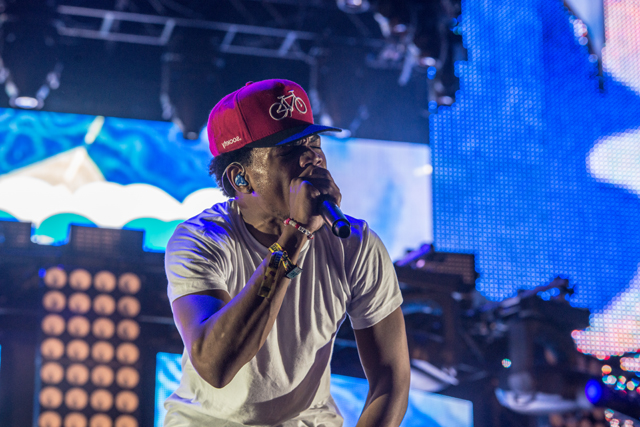Vic Mensa / Photos by Petya ShalamanovaOn Saturday at Lollapalooza, thrilled fans swarmed the area in front of stage a half hour ahead of Vic Mensa’s arrival—no small feat since Nas was only halfway through his own set across the park. Beach balls, posters reading “Vic Fuckin Mensa,” and wisps of weed smoke rose up from the crowd. Near the front, a freestyle session broke out, with three kids trading verses. Others tried to negotiate their way to the gap between the stage and the fence, eager to catch a glimpse of Chance The Rapper hanging out at his pal’s set (they succeeded). Vic’s DJ opened things up by asking the crowd, “Who the fuck is from Chicago in this bitch?”This year, Vic Mensa was performing in the slot Chance played last year, closing out a day on the second-tier BMI stage. The stage was notably too small for Chance last year, since between getting booked and playing his set he dropped Acid Rap and toured with Mac Miller. Vic’s crowd didn’t quite fill the area from fence to fence, but it was buzzing with bouncy enthusiasm. So was Vic, who put on a great show that was both thoughtful and party-ready. He (and Chance, who made his inevitable appearance late in the set), talked about how excited he was to be on the other side of the stage this time, a fan turned performer who wanted to be one with the crowd. At one point, he discussed an incident three years ago at the park, when a fall from a fence put him in the hospital and nearly killed him. “What will my obituary be?” he asked, resonating not only with the fans here, living for the moment, but with the difficult reality of growing up as a black male in Chicago. He kept to the front edge of the stage nearly the entire set, reaching out to the audience and drawing them in. The set was heavy on antics, too, though, with a blow-up sex doll, supersoakers, a fog machine, bottles of orange soda, and members of the SAVEMONEY crew all making appearances. Later on, Vic inexplicably played a crunchy cover of “Seven Nation Army.” He couldn’t really hit the notes at all and didn’t even attempt Jack White’s falsetto, but the sheer randomness of it had the audience hooked and clapping in unison.Mensa’s line from “Orange Soda,” “They made a list about Chicago rappers and they skipped me,” has become his rallying cry. His mission to emphasize the press's glaring oversight continued here, and, from the sounds of some new material he played during his set, he could be in line for one of the bigger stages next year. Overall, his set was gleefully indulgent and totally crowd-pleasing.
The set was heavy on antics, too, though, with a blow-up sex doll, supersoakers, a fog machine, bottles of orange soda, and members of the SAVEMONEY crew all making appearances. Later on, Vic inexplicably played a crunchy cover of “Seven Nation Army.” He couldn’t really hit the notes at all and didn’t even attempt Jack White’s falsetto, but the sheer randomness of it had the audience hooked and clapping in unison.Mensa’s line from “Orange Soda,” “They made a list about Chicago rappers and they skipped me,” has become his rallying cry. His mission to emphasize the press's glaring oversight continued here, and, from the sounds of some new material he played during his set, he could be in line for one of the bigger stages next year. Overall, his set was gleefully indulgent and totally crowd-pleasing. Chance the RapperThe next night, Chance The Rapper took the stage ready to bask in the adulation of his hometown fans. Closing out the day on the Perry’s stage, which was otherwise used mostly for DJs, he also delivered a compelling performance, with boundless exuberance and extensive crowd work. It rained hard on and off all day Sunday, so by the time Chance played, the PLUR crowd had made sure the field had taken the most abuse of any in the festival. It was basically one giant mud pit. Still, the rain-drenched audience was ecstatic to see him, with people sprinting through the festival a half-hour before his start time to secure a good spot. Judging purely on festival-goers’ shirts over the three days, Chance was the most anticipated act of the festival, second only to Michael Jordan in terms of total shirt appearances. Not bad company for the 21-year-old.“This is my moment,” Chance announced shortly after he took the stage. Backed by a full arena-ready band, complete with a trumpet and backup singers on an elevated platform, he opted for warped takes on his well-known Acid Rap tracks and funkier, fuller versions of songs off his 10 Day mixtape. He kicked things off with “Somebody’s Everything,” then led the crowd in a “got damn” chant that rolled into “Pusha Man.” The screen setup, the most elaborate of any stage in the festival, went psychedelic, with Chance’s lyrics flashing behind him in neon. This may have been partly to help out the audience; he thrust the mic in the audience’s direction to let them sing large chunks of several songs, including much of “Juice” and the entire first chorus of “Cocoa Butter Kisses.” It maybe wasn't the best strategy for creating new fans, but it sure as hell pleased the old ones, who sang every word.
Chance the RapperThe next night, Chance The Rapper took the stage ready to bask in the adulation of his hometown fans. Closing out the day on the Perry’s stage, which was otherwise used mostly for DJs, he also delivered a compelling performance, with boundless exuberance and extensive crowd work. It rained hard on and off all day Sunday, so by the time Chance played, the PLUR crowd had made sure the field had taken the most abuse of any in the festival. It was basically one giant mud pit. Still, the rain-drenched audience was ecstatic to see him, with people sprinting through the festival a half-hour before his start time to secure a good spot. Judging purely on festival-goers’ shirts over the three days, Chance was the most anticipated act of the festival, second only to Michael Jordan in terms of total shirt appearances. Not bad company for the 21-year-old.“This is my moment,” Chance announced shortly after he took the stage. Backed by a full arena-ready band, complete with a trumpet and backup singers on an elevated platform, he opted for warped takes on his well-known Acid Rap tracks and funkier, fuller versions of songs off his 10 Day mixtape. He kicked things off with “Somebody’s Everything,” then led the crowd in a “got damn” chant that rolled into “Pusha Man.” The screen setup, the most elaborate of any stage in the festival, went psychedelic, with Chance’s lyrics flashing behind him in neon. This may have been partly to help out the audience; he thrust the mic in the audience’s direction to let them sing large chunks of several songs, including much of “Juice” and the entire first chorus of “Cocoa Butter Kisses.” It maybe wasn't the best strategy for creating new fans, but it sure as hell pleased the old ones, who sang every word. There were a few surprises that really cemented Chance’s status as a deserving headliner act, though. Most of Lollapalooza’s other nightly closers—Eminem, OutKast, and Arctic Monkeys—are festival vets, while fellow rising stars like Lorde and Iggy Azalea played smaller stages or earlier in the day. But Chance lived up to the expectations for spectacle from a headliner. A few songs in, he broke out his surprisingly touching cover of the Arthur theme song, for the last few months a regular part of his setlist. It fits right in with his aesthetic and “every day could be wonderful” approach. Vic Mensa made an appearance, but the big reveal was a white-hooded, sunglasses-clad figure who turned out to be R. Kelly. He did “Ignition (Remix)” and was gone, but the appearance of one of the city’s towering musical figures during Chance’s set was an affirmation of his place in Chicago’s scene.Perhaps the best song of the set was the deep, mournful “Paranoia,” where Chance and the trumpet traded lines of anguish. While watching him amble around and encourage the crowd to jump and sing along was enjoyable, Chance is at his best when he loses himself in his words.
There were a few surprises that really cemented Chance’s status as a deserving headliner act, though. Most of Lollapalooza’s other nightly closers—Eminem, OutKast, and Arctic Monkeys—are festival vets, while fellow rising stars like Lorde and Iggy Azalea played smaller stages or earlier in the day. But Chance lived up to the expectations for spectacle from a headliner. A few songs in, he broke out his surprisingly touching cover of the Arthur theme song, for the last few months a regular part of his setlist. It fits right in with his aesthetic and “every day could be wonderful” approach. Vic Mensa made an appearance, but the big reveal was a white-hooded, sunglasses-clad figure who turned out to be R. Kelly. He did “Ignition (Remix)” and was gone, but the appearance of one of the city’s towering musical figures during Chance’s set was an affirmation of his place in Chicago’s scene.Perhaps the best song of the set was the deep, mournful “Paranoia,” where Chance and the trumpet traded lines of anguish. While watching him amble around and encourage the crowd to jump and sing along was enjoyable, Chance is at his best when he loses himself in his words. The presence of Chance The Rapper and Vic Mensa also emphasized how thrilling and important it is to have local acts at the festival. In its tenth year in the city, Lollapalooza is a Chicago summer institution, taking over Grant Park, featuring a ton of local vendors, and contributing an estimated $140 million to the local economy. A sizable portion of attendees come from out of town, not to mention from outside the country, for the festival, so it’s an ideal opportunity to showcase Chicago’s musical talent, a key part of making the city what it is. Yet Lollapalooza falls short of what it could be doing.Mic’s Matthew Pollock and WBEZ’s Jim DeRogatis have both taken in-depth looks at Lollapalooza’s “radius clause,” which reportedly stipulates that bands playing the fest aren’t permitted to play another show in a 300-mile radius—an area that encompasses Detroit, Indianapolis, and St. Louis—for six months before the festival and three months after it. In addition to putting a chokehold on bands and fans, it’s been a legal issue in the past, with the Illinois Attorney General investigating C3 Presents, Lollapalooza’s promoter, for antitrust activities in 2010.
The presence of Chance The Rapper and Vic Mensa also emphasized how thrilling and important it is to have local acts at the festival. In its tenth year in the city, Lollapalooza is a Chicago summer institution, taking over Grant Park, featuring a ton of local vendors, and contributing an estimated $140 million to the local economy. A sizable portion of attendees come from out of town, not to mention from outside the country, for the festival, so it’s an ideal opportunity to showcase Chicago’s musical talent, a key part of making the city what it is. Yet Lollapalooza falls short of what it could be doing.Mic’s Matthew Pollock and WBEZ’s Jim DeRogatis have both taken in-depth looks at Lollapalooza’s “radius clause,” which reportedly stipulates that bands playing the fest aren’t permitted to play another show in a 300-mile radius—an area that encompasses Detroit, Indianapolis, and St. Louis—for six months before the festival and three months after it. In addition to putting a chokehold on bands and fans, it’s been a legal issue in the past, with the Illinois Attorney General investigating C3 Presents, Lollapalooza’s promoter, for antitrust activities in 2010. Having such a clause isn’t unusual for a music festival’s promoters, who obviously want to stimulate interest in their lineup by ensuring that the bands playing it aren’t performing elsewhere in the vicinity, at a place with cheaper ticket prices. (There’s a zinger here about what it means that Lollapalooza’s 2014 headliners are virtually all repeat performers, and maybe they ought to impose a clause on themselves that they book new acts instead of Kings of Leon for the fourth time, but whatever.) Lollapalooza’s policy is much stricter than that of most other festivals, and the reasons for it are increasingly baseless. It made sense when the fest was still growing and depended on having a can’t-see-it-anywhere-else lineup to generate ticket sales. But this year, as it did last year, the fest sold out of three-day passes before the lineup was even announced. Fans willing to purchase tickets based on a purely theoretical list of performers probably won’t be too mad if Skrillex hits St. Louis in April before he plays Lolla in August.Pollock noted that the festival relaxed its radius clause somewhat this year, allowing acts like OutKast, Chvrches, and Arctic Monkeys to play festivals in other cities, but hasn’t been as willing to extend this permission to the mid-level acts that might benefit more from the increased exposure. It’s unlikely anyone would drop $100 for a single day to see Foster the People, Rich Homie Quan, or Parquet Courts, and it’s hard to imagine that paying to see Lorde is somehow cheapened because they saw Warpaint in Chicago in June. For bands that depend on touring to make money and broaden their fanbase, playing a mid-day set on a smaller stage at a music festival is a significant opportunity, but it doesn’t have to come at the expense of headlining another show at smaller venue 150 miles away.
Having such a clause isn’t unusual for a music festival’s promoters, who obviously want to stimulate interest in their lineup by ensuring that the bands playing it aren’t performing elsewhere in the vicinity, at a place with cheaper ticket prices. (There’s a zinger here about what it means that Lollapalooza’s 2014 headliners are virtually all repeat performers, and maybe they ought to impose a clause on themselves that they book new acts instead of Kings of Leon for the fourth time, but whatever.) Lollapalooza’s policy is much stricter than that of most other festivals, and the reasons for it are increasingly baseless. It made sense when the fest was still growing and depended on having a can’t-see-it-anywhere-else lineup to generate ticket sales. But this year, as it did last year, the fest sold out of three-day passes before the lineup was even announced. Fans willing to purchase tickets based on a purely theoretical list of performers probably won’t be too mad if Skrillex hits St. Louis in April before he plays Lolla in August.Pollock noted that the festival relaxed its radius clause somewhat this year, allowing acts like OutKast, Chvrches, and Arctic Monkeys to play festivals in other cities, but hasn’t been as willing to extend this permission to the mid-level acts that might benefit more from the increased exposure. It’s unlikely anyone would drop $100 for a single day to see Foster the People, Rich Homie Quan, or Parquet Courts, and it’s hard to imagine that paying to see Lorde is somehow cheapened because they saw Warpaint in Chicago in June. For bands that depend on touring to make money and broaden their fanbase, playing a mid-day set on a smaller stage at a music festival is a significant opportunity, but it doesn’t have to come at the expense of headlining another show at smaller venue 150 miles away. In the case of Chance The Rapper, an artist who now has enough national exposure to fill out a stage at music festivals nearly anywhere, his headlining set was a sweet homecoming, but it does leave fans who can’t or don’t want to shell out for the full set unable to see him live around town for a while. As for Vic Mensa, an exciting performer who’s been on a roll, he’s the kind of act that benefits from being a favorite son, and I’m willing to bet his most devoted fans would be willing to see him multiple times this year. That’s where his career’s at right now. But for local acts that don’t travel far and wide, playing Lollapalooza isn’t really an option if it prevents them from performing elsewhere. The fest did feature some other local acts this year, including emo revivalists Into It. Over It., EDMers Krewella, and plurnt DJ duo Flosstradamus, but it would be cool to see the festival’s organizers give stage time to performers from one of the country’s best and most diverse music scenes. Both Chance and Vic’s sets showed how much natural energy and goodwill arises from doing so.
In the case of Chance The Rapper, an artist who now has enough national exposure to fill out a stage at music festivals nearly anywhere, his headlining set was a sweet homecoming, but it does leave fans who can’t or don’t want to shell out for the full set unable to see him live around town for a while. As for Vic Mensa, an exciting performer who’s been on a roll, he’s the kind of act that benefits from being a favorite son, and I’m willing to bet his most devoted fans would be willing to see him multiple times this year. That’s where his career’s at right now. But for local acts that don’t travel far and wide, playing Lollapalooza isn’t really an option if it prevents them from performing elsewhere. The fest did feature some other local acts this year, including emo revivalists Into It. Over It., EDMers Krewella, and plurnt DJ duo Flosstradamus, but it would be cool to see the festival’s organizers give stage time to performers from one of the country’s best and most diverse music scenes. Both Chance and Vic’s sets showed how much natural energy and goodwill arises from doing so. For native Chicagoans and out-of-towners alike, having more Chicago artists on the slate would heighten the whole experience. The festival doesn’t take place in the middle of nowhere, and the promoters could certainly take steps to align themselves more with the Chicago music scene. There’s definitely room to switch it up somewhat—there were fairly underwhelming responses to established rock acts this year, like the small, disinterested crowd at Friday’s Interpol set, or even the Vic Mensa-sized audience for Jenny Lewis, who put on a stellar show for chiefly mellowed-out onlookers. It seems like giving some rising Chicago rappers, like Lil Durk, ZMoney, or Tree—who showed off his festival readiness at Pitchfork last year—an opportunity could help inject more focus and local buzz into the festival. Local non-hip-hop acts, like psych-pop duo Wild Belle, who played last year, should appear with more frequency as well. The festival’s contract with the city extends through at least 2021, with options for each subsequent year, so it will continue anchoring Chicago’s jam-packed summer events calendar for the foreseeable future. Rather than the promoters slapping the most well-known names it can find find on its performer list year after year, having more Chicago performers would help ensure that Lollapalooza keeps evolving.After all, by delivering sets that more than delivered on their considerable hype and gave hometown fans exactly what they wanted, Chance and Vic offered some of the festival's biggest highlights, the moments that made it feel like a truly unique, unforgettable Chicago event. Save Money's stars have been huge proponents of the festival, and the way they treated Lollapalooza—like their festival, like their victory lap, like their homecoming—is the way the organizers should want everyone to approach it. While Lollapalooza was full of highlights, Chance and Vic made sure that for many people, the biggest highlight of all was Chicago itself.Devin Schiff is very thrifty, and he loves to Save Money. He's on Twitter - @devinschiff--Want more Lollapalooza? Check these out:Summerplayalisticadillacmuzik: Outkast is a Soundtrack for All of UsEminem Did the Unexpected and Gave Lollapalooza Exactly What They WantedBlood Orange Says He Was Assaulted by Security at Lollapalooza Yesterday and Unfortunately It's Not Much of SurpriseI Only Learn: Lykke Li's Power Ballads Keep Getting More PowerfulThe Scenes of Lollapalooza, Day OneThe Scenes of Lollapalooza, Day Two
For native Chicagoans and out-of-towners alike, having more Chicago artists on the slate would heighten the whole experience. The festival doesn’t take place in the middle of nowhere, and the promoters could certainly take steps to align themselves more with the Chicago music scene. There’s definitely room to switch it up somewhat—there were fairly underwhelming responses to established rock acts this year, like the small, disinterested crowd at Friday’s Interpol set, or even the Vic Mensa-sized audience for Jenny Lewis, who put on a stellar show for chiefly mellowed-out onlookers. It seems like giving some rising Chicago rappers, like Lil Durk, ZMoney, or Tree—who showed off his festival readiness at Pitchfork last year—an opportunity could help inject more focus and local buzz into the festival. Local non-hip-hop acts, like psych-pop duo Wild Belle, who played last year, should appear with more frequency as well. The festival’s contract with the city extends through at least 2021, with options for each subsequent year, so it will continue anchoring Chicago’s jam-packed summer events calendar for the foreseeable future. Rather than the promoters slapping the most well-known names it can find find on its performer list year after year, having more Chicago performers would help ensure that Lollapalooza keeps evolving.After all, by delivering sets that more than delivered on their considerable hype and gave hometown fans exactly what they wanted, Chance and Vic offered some of the festival's biggest highlights, the moments that made it feel like a truly unique, unforgettable Chicago event. Save Money's stars have been huge proponents of the festival, and the way they treated Lollapalooza—like their festival, like their victory lap, like their homecoming—is the way the organizers should want everyone to approach it. While Lollapalooza was full of highlights, Chance and Vic made sure that for many people, the biggest highlight of all was Chicago itself.Devin Schiff is very thrifty, and he loves to Save Money. He's on Twitter - @devinschiff--Want more Lollapalooza? Check these out:Summerplayalisticadillacmuzik: Outkast is a Soundtrack for All of UsEminem Did the Unexpected and Gave Lollapalooza Exactly What They WantedBlood Orange Says He Was Assaulted by Security at Lollapalooza Yesterday and Unfortunately It's Not Much of SurpriseI Only Learn: Lykke Li's Power Ballads Keep Getting More PowerfulThe Scenes of Lollapalooza, Day OneThe Scenes of Lollapalooza, Day Two
Advertisement

Advertisement

Advertisement


Advertisement

Advertisement

Advertisement

Advertisement